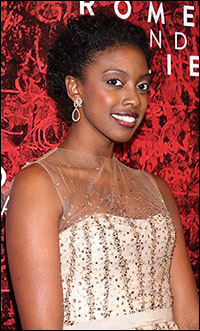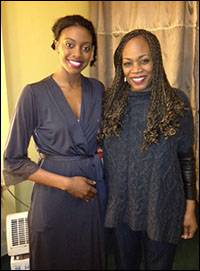
Almost 30 years have passed since William Shakespeare's legendary play about young star-crossed lovers and their tragic fate has been seen on The Great White Way. Two-time Tony Award nominee Condola Rashad currently stars in David Leveaux's new production of the timeless love story. But in 1986, a budding actress from Dallas made theatre history as the first African-American woman to portray Juliet Capulet in a Joseph Papp-produced repertory production directed by Estelle Parsons. It was the last time the play was on Broadway. The two actresses, who have gained acclaim beyond the theatre world, share their accounts of playing Shakespeare's most famous female character.
Regina Taylor
Golden Globe Award winner ("I'll Fly Away") and noted playwright (Drowning Crow, Crowns, stop.reset) Taylor starred opposite Rene Moreno in Romeo and Juliet at the Belasco Theatre (performed in rep November 1986 through May 1987 alongside All's Well That Ends Well and Macbeth).
"It was a wonderful experience. It started at Joseph Papp's company downtown, spearheaded by Estelle Parsons. It was a multicultural company. We did Shakespeare yearlong and we went around to the different pubs in New York City and in Brooklyn. And then we landed at the Belasco Theatre doing All's Well That Ends Well, Macbeth and Romeo and Juliet.
"I was just blown away when I got the news I had the role. I was in my twenties, I had graduated from Southern Methodist University, moved from Dallas Texas to New York City and had been struggling for a while. I gave myself maybe about seven years, I said, to try and pay my rent doing what I love — acting. I started out with doing a lot of odd jobs and a few roles in between to being able to really be able to pick up steam when I started doing the regional circuit. And that opportunity with the Public Theater and with Mr. Papp's blessing led me to be able to rise in the ranks at the Public Theater. That was my first job, starting out as an understudy and a walk-on. Having a place where you can grow was an amazing thing — to be able to start in these small roles and grow into a leading role on Broadway was really great and I really do think that was a great testament of Joseph Papp. "Playing Juliet was the most challenging thing that I had ever done in my life. It was something that I worked really hard at every day even as we were up and running, I was still working at character, discovering my character, perfecting my character. It was an amazing experience. It was a dream role. And to be able to think that I could play the young ingénue was unbelievable at that time and so to be able to realize that was very special.
"I originally started out at the beginning of the company by doing Peter, who has the smallest lines in the play when we were downtown and touring. I worked my way up to doing Richard and then the Apothecary character and then finally at the Belasco Theatre playing Juliet. So it was an amazing time with fantastic actors headed by Estelle Parsons and it was something where audiences were expanding what their expectations were coming in to see this little chocolate girl playing this iconic role.
"Romeo and Juliet was my Broadway debut. At that point, when I landed in New York, it was the beginning of the discussion of diversity, of colorblind casting as it were. So I reaped the benefits of that. I think, as with any change, some people are resistant to it but for the most part, it was people welcoming it with opened arms.
"I was already doing the regional theatre circuit doing Shakespeare so I felt like I was prepared to do it and I had a wonderful experience. I feel like in general with the general public, people coming in may have certain expectations and you challenge those expectations. And some people meet you and some people don't. For the most part, people met us."
| |
 |
|
| Condola Rashad | ||
| Photo by Joseph Marzullo/WENN |
Two-time Tony Award nominee (Stick Fly, The Trip To Bountiful) currently stars opposite Orlando Bloom in Romeo and Juliet at the Richard Rodgers Theatre.
"I studied Shakespeare a little bit in college actually. That was my first time ever really tackling [it]. It's so funny because I have been wanting to do it. One of my goals has been to do Shakespeare. Professionally, that was my next goal. That's something I really wanted to do because one, it's such an honor to do it and two, it makes you a better actor, so I was like, 'Well, I'm going to do Shakespeare. I know it.'
"I actually heard through the grapevine, I was out somewhere, and I heard a rumor that they were doing Romeo and Juliet on Broadway. It was a rumor. So I called my agent and I said 'Have you heard about this rumor?' He said 'Yes, it's not a rumor.' I said, 'We gotta get me in there. I gotta go in for that.' So they managed to get me in and I went in for David and they kind of liked what I did so I came back again. I didn't tell anybody that I went in for it, because I find that when I don't tell people a lot of things, they often go for the better, because it's less energy put on the subject. So I didn't tell anybody. So over the course of six months, I went in five different times. And then my fifth audition was the audition where I went to Los Angeles to read with Orlando and here I am. This was before A Trip to Bountiful.
"When I found out that I got this role, I worked with a master named Stephen Skybell, and I went in there and I broke down the text because the thing about Shakespeare is that it's all truth. So any bad habits you have, you have to learn how to get rid of them because it's all about telling the truth. So any other bells and whistles you put on any other role, it's not going to work for Shakespeare.
 |
||
| Rashad and Taylor backstage |
"Our production's approach was not playing it as a tragedy from the beginning because that's not that interesting. We all do know how it ends. The biggest thing for us, which I think we found in the production, is that you're not going to care about these two young people taking their lives if you didn't care about their lives when they were living it. You're not going to feel affected by the loss of life if you weren't affected by the presence of it. So our first act, it's not like we had to do more to make it funny, it's just naturally a funny first act. So I think we bring a certain sense of vibrancy to these characters so when their lights burn out, you miss them. That's our goal anyway.
"Reviewers are going to say what they're going to say, and you can't control what they're going to say especially with a play like Romeo and Juliet, where people do know what it is and people already set up in their minds what they want it to be. So people who've done that, they're not going to be open to anything new. So you just have to do what you do. What I really pay attention to is the audience. If a 10-year old girl comes up to me and says that she loves it and that she's never seen anything like and she's able to understand it, we've done something."

























